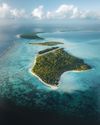
People will tell the same old story until they hear a better tale," says Ahmed, an elder I meet by chance in Tangier's casbah - a Cubist jumble of white buildings beneath circling gulls that cry out over the morning call to prayer. We're chatting, perched on the high ramparts of the old Portuguese citadel, our heels in Africa, Europe on the horizon like a giant seabird gliding toward us. "Birds go back and forth without borders," muses Ahmed, his words flying just as freely among Darija (Moroccan Arabic), French, and Spanish. Tanjawi - or Tangerines - are sociable polyglots who speak in a meze of languages. Ahmed's hair is as silvered as Moroccan sardines, his green eyes drizzled with amber like the olive oil in bissara pea soup.
Colors pop in this city of white and pearly light: the emerald of mint sold next to nets of escargot and the jade roofs of mosques; the yellow stripes of hooded djellaba robes; the cumin-like sprinkles of gold bougainvillea - and everywhere, across the network of roof terraces, the oily indigo brushstrokes of the sea. The shifting politics of the Gibraltar Strait have endlessly recalibrated the fate of Morocco's northernmost port city and the identity of its people; Tangier has been held by the Phoenicians, Portuguese, Middle Eastern caliphates, Spanish, British, and French before becoming the Moroccan sultanate's diplomatic center in the late 19th century. "We have been a nexus of culture in the Mediterranean for thousands of years, and Jews and Muslims coexisted in peace," says Ahmed. "Yet in the West, they only talk about the moment 20th-century colonists created 'the Tangerine dream.'" Ahmed is referring to the era in Tangier's history, beginning in the interwar period and peaking in the 1950s, when the city served as a licentious playground for a motley assortment of artists, socialites, and hedonists.
Bu hikaye Condé Nast Traveler US dergisinin September - October 2023 sayısından alınmıştır.
Start your 7-day Magzter GOLD free trial to access thousands of curated premium stories, and 9,000+ magazines and newspapers.
Already a subscriber ? Giriş Yap
Bu hikaye Condé Nast Traveler US dergisinin September - October 2023 sayısından alınmıştır.
Start your 7-day Magzter GOLD free trial to access thousands of curated premium stories, and 9,000+ magazines and newspapers.
Already a subscriber? Giriş Yap

The Brando
THE STORY GOES that actor Marlon Brando first arrived on the 18-isle atoll of Tetiaroa by water-as in, he swam ashore.

Jumeirah Burj AI Arab
IF EVER THERE WAS a hotel that could achieve landmark status, it is Dubai's Jumeirah Burj AI Arab, which stands alone on its own purpose-built island just off Jumeirah Beach.

Blackberry Farm
BLACKBERRY FARM LOOMS in the consciousness of many travelers as an almost mythical Southern sanctuary in the foothills of the Great Smoky Mountains, a place whose storybook perfection has to be experienced to be believed.

Fogo Island Inn
THIS 29-ROOM MODERN CLASSIC in Newfoundland is a model for place-specific hospitality, dreamed up by founder Zita Cobb and built by Shorefast, a nonprofit that supports economic and cultural resilience on the hotel's namesake island and runs artist residencies in four isolated, incredibly photogenic studios.

ALAN CUMMING on CROSSING THE ATLANTIC
I went on Cunard's Queen Mary 2 for the first time in 2011.

high life
Italy's unfussy Dolomites are a place of cheerful communities, where simple chalets and good food can almost outshine the skiing

the possibility of an island
Cuba may be facing tough times, but the country's hoteliers, creators, and artists are forging a hopeful and beautiful way forward

in full bloom
Over the past three years, hotelier Fabrizio Ruspoli has turned an old olive farm south of Marrakech into the High Atlas's most intoxicating garden retreat

ALLIN
Fun has never been hard to come by in Las Vegas, but the arrival of pro sports, the Sphere, and lavish new hotels has upped the ante.

Forward March
Across Kenya, community initiatives are protecting the country's wildlife and environment. By Mary Holland